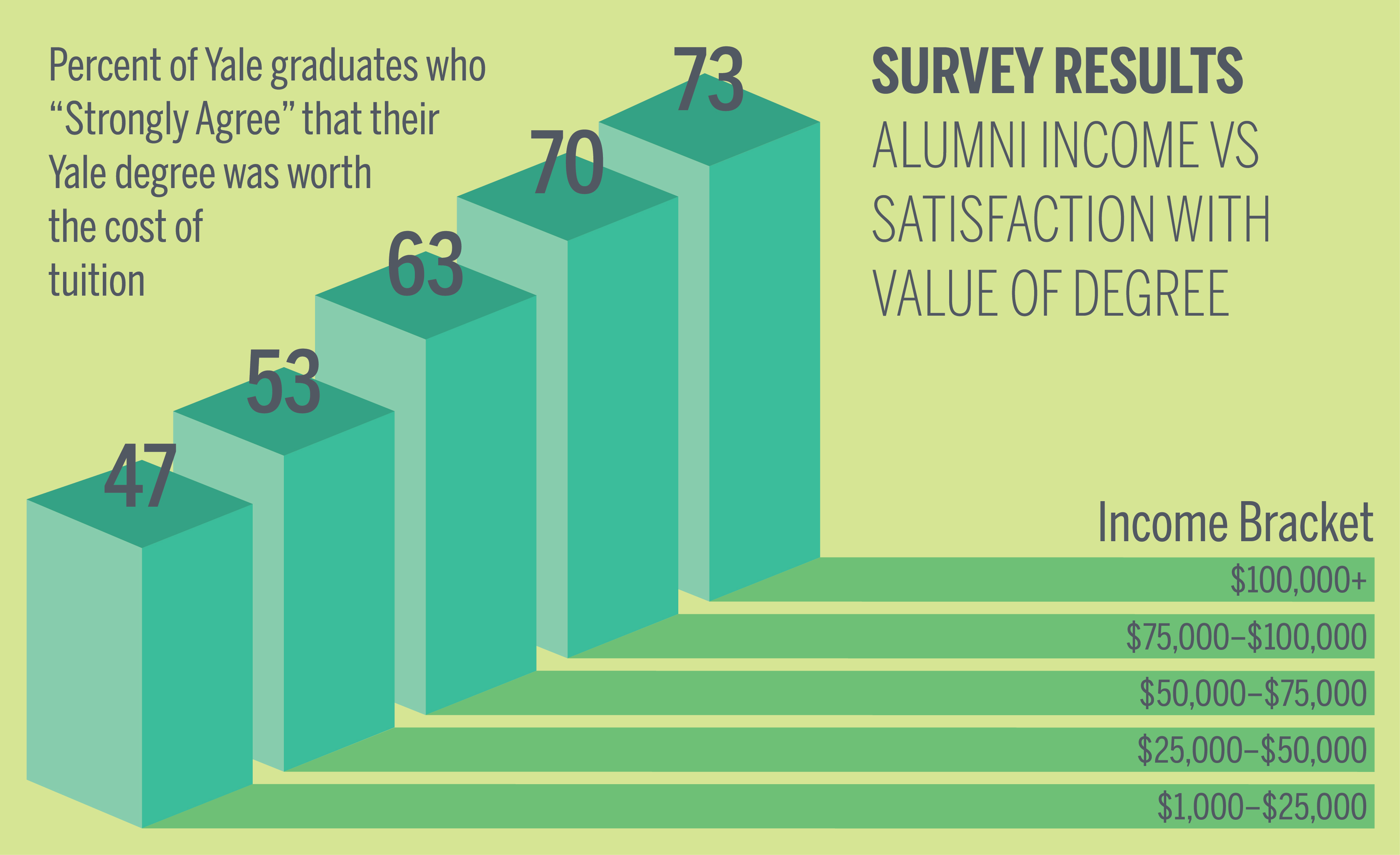
For Yale graduates, money may buy happiness — at least when it comes to their education.
On Sept. 29, the Chronicle of Higher Education published the results of a Gallup-Purdue Index survey which found that 50 percent of 30,000 college alumni nationwide strongly agreed that their college degrees were worth the cost. At research universities like Yale, a slightly higher-than-average 53 percent of respondents felt the same.
In response to the Gallup numbers, the News distributed a comprehensive survey to the classes of 2013 and 2014 asking whether they believed their education justified the cost of Yale tuition. Three hundred forty-four alumni responded, and results suggest that graduates of Yale and universities nationally have something in common: the higher the income, the higher the satisfaction.
Gallup divided its survey respondents into four income brackets: under $36,000, between $36,000 and $60,000, between $60,000 and $120,000 and more than $120,000. 31 percent of the first bracket strongly agreed that their education was worth the cost, as did 37 percent of the second, 47 percent of the third and 51 percent of the fourth — representing a 20 percent margin.
The survey results for Yale graduates reveal a similar trend. Of respondents earning between $1 and $25,000, 47 percent strongly agreed that their education was worth the cost of tuition. That number increased to 53 percent for those earning between $25,001 and $50,000, 63 percent for those earning between $50,001 and $75,000, 70 percent for those earning between $75,001 and $100,000 and 73 percent for those earning more than $100,000.
Of the administrators and 18 survey participants interviewed more extensively by the News, the majority said income and satisfaction were at least somewhat related. However, seven of those interviewed disagreed with the association, citing the importance of pursuing one’s passion at Yale and in life — no matter the financial implications.
“I came to Yale because I wanted to learn how to be happy. I didn’t go to Yale because I wanted to be rich,” said Julia Pucci ’13, who strongly agreed her Yale education was worth the cost of tuition.
But Simon Cozzens ’13 — who currently falls in a low income bracket — said that while the importance of income may seem negligible to students, he wishes he had spent more time preparing for a particular career while at Yale. Though he still strongly agrees that the cost of his tuition was worth it, Cozzens said his current income impacts the way he views the value and purpose of his Yale education.
Annie Barry ’14, whose annual income falls between $75,001 and $100,000, said her relatively high pay is part of why she strongly agrees her Yale education was worth the cost of tuition. But she added that her income is only part of what feeds her satisfaction, as she also values the title and substance of her work in marketing at Walmart.
Rather than directly relate income to satisfaction with her Yale degree, Marlena Vasquez ’13 said it is the financial security her income brings that matters most. If she were less financially secure, Vasquez said that she would likely feel less satisfied with Yale.
Office of Career Strategy Director Jeanine Dames said there are many factors that influence individual satisfaction among Yale alumni, including financial security.
“Satisfaction is very individualized, so it will be based on the goals of each person,” Dames said “For some students satisfaction may come with finding a career they love, for others it may be the intellectual stimulation of their program at Yale. For some it may be the social networks they formed at Yale and the friends they stay in touch with after graduation. For still others it may be achieving financial security after graduation.”
With an annual income of over $100,000, Aayush Upadhyay ’14 said while he would relate his current earnings to the worth of his Yale education, his salary is just one of the reasons why he strongly agrees his education was worth the cost of tuition. A Google employee, Upadhyay said the primary reason he feels satisfied with Yale is because he has a job he greatly desired and enjoys.
Zach Graham ’13 said he does not relate income with the value of his Yale degree, adding that graduates should base their satisfaction on their contentment in employment.
“If people pursue a profession they believe will make them happy, then compensation shouldn’t make a difference,” he said.







